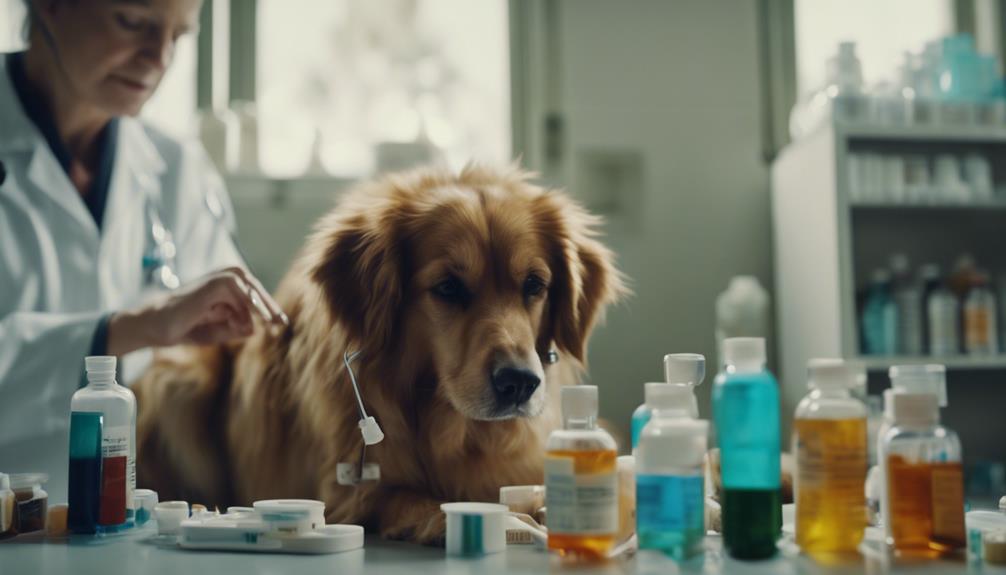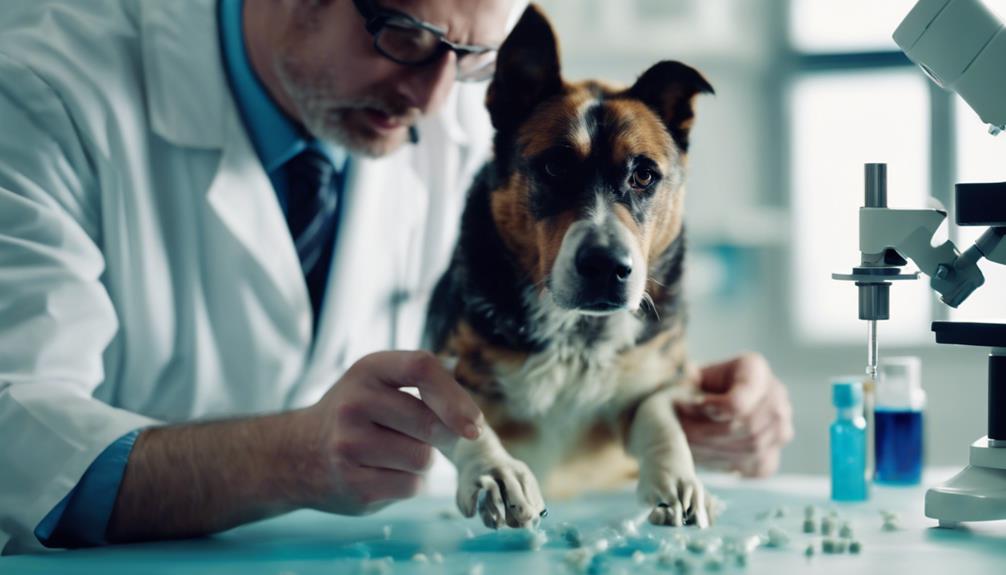Gastroenteritis in dogs is a multifaceted condition that warrants a comprehensive understanding to navigate its complexities effectively. From the subtle signs to the underlying causes, the diagnosis and treatment of this ailment require a meticulous approach.
By exploring the intricate interplay of factors contributing to gastroenteritis in dogs, a clearer picture emerges, offering insights into tailored management strategies.
As we delve into the nuances of this prevalent canine ailment, the intricate web of causes, diagnostic modalities, and therapeutic interventions unravels, paving the way for informed decision-making and improved outcomes in clinical practice.
Key Takeaways
- Dietary indiscretion and parasites are common causes of gastroenteritis in dogs.
- Symptoms include diarrhea, vomiting, and abdominal discomfort.
- Diagnosis involves a thorough medical history and diagnostic tests like blood work.
- Treatment includes medications, dietary management, and hydration for supportive care.
Understanding Gastroenteritis in Dogs
Gastroenteritis in dogs is a common gastrointestinal condition characterized by inflammation of the stomach and intestines. This inflammation can lead to symptoms such as diarrhea, vomiting, and abdominal discomfort. Acute gastroenteritis can occur suddenly, often due to dietary indiscretion or infectious agents, while chronic gastroenteritis may develop over an extended period.
Dogs experiencing gastroenteritis may exhibit signs of discomfort, changes in appetite, and alterations in stool consistency. Understanding the causes, symptoms, and diagnostic procedures for gastroenteritis is crucial for effective management and treatment. Prompt veterinary care, including appropriate diagnostic tests and tailored treatment plans, can help alleviate symptoms, restore gastrointestinal health, and improve the overall well-being of affected dogs.
Symptoms of Gastroenteritis in Dogs
Symptoms of gastroenteritis in dogs manifest as a range of gastrointestinal disturbances that can indicate underlying inflammation and discomfort in the digestive system. The main symptom is diarrhea, which may vary in consistency and frequency. Dogs with gastroenteritis may show signs of straining during defecation and have accidents inside the house.
The diarrhea can be watery and may contain mucus. Vomiting is another common symptom, especially occurring after eating. Additionally, dogs may exhibit signs of abdominal discomfort, such as bloating or hunching over. It is essential to monitor these symptoms closely, as they can indicate a potential issue with the dog's gastrointestinal health and require prompt veterinary attention.
Causes of Gastroenteritis in Dogs

Commonly, gastroenteritis in dogs is triggered by various factors, including disruptions in the gut microbiome and a range of potential causes such as dietary indiscretion, parasites, food allergies, cancer, viruses, toxins, and systemic diseases.
Causes of Gastroenteritis in Dogs:
- Dietary Indiscretion: Consuming garbage, spoiled food, or unfamiliar substances.
- Parasites: Infections from worms like roundworms, hookworms, or giardia.
- Food Allergies: Reactions to specific ingredients in their diet.
These factors can lead to inflammation and irritation of the gastrointestinal tract, resulting in symptoms like diarrhea and vomiting. Identifying the underlying cause is crucial for effective treatment and management of gastroenteritis in dogs.
Diagnosing Gastroenteritis in Dogs
The diagnosis of gastroenteritis in dogs involves a thorough examination of the animal's medical history and clinical presentation. Veterinarians typically start by inquiring about the dog's diet, recent exposures, and the onset of symptoms.
Since gastroenteritis shares symptoms with other conditions, diagnosis often involves ruling out other potential diseases through a process of exclusion. Diagnostic tests such as blood work, fecal exams, abdominal X-rays, and ultrasounds may be conducted to assess the dog's health status.
These tests help to identify any underlying causes of the gastroenteritis, such as infections, parasites, or structural abnormalities. By carefully evaluating the dog's history and performing diagnostic tests, veterinarians can accurately diagnose gastroenteritis and determine the appropriate treatment plan.
Treatment Options for Gastroenteritis in Dogs

Upon confirming the diagnosis of gastroenteritis in dogs through a comprehensive examination and diagnostic testing, treatment options aimed at addressing the symptoms and underlying causes of the condition become crucial.
When treating gastroenteritis in dogs, the following options are commonly considered:
- Medications: Antibiotics may be prescribed to combat bacterial infections, while anti-nausea drugs help alleviate vomiting. Probiotics can aid in restoring the balance of beneficial bacteria in the gut.
- Dietary Management: Transitioning the dog to a bland diet can help reduce gastrointestinal irritation. It's essential to avoid rich or fatty foods during this period.
- Hydration and Supportive Care: In severe cases, in-hospital treatment with intravenous (IV) fluids may be necessary to restore hydration and electrolyte balance.
Gut Microbiome Disruption
An imbalance in the gut microbiome can significantly contribute to the development of gastroenteritis in dogs. The gut microbiome plays a crucial role in maintaining gastrointestinal health by aiding in digestion, nutrient absorption, and immune function.
When this delicate balance is disrupted, it can lead to inflammation and irritation of the gastrointestinal tract, resulting in symptoms such as diarrhea and vomiting. Factors such as dietary changes, stress, medications, and underlying health conditions can disrupt the gut microbiome in dogs.
Restoring balance to the gut microbiome through the use of probiotics and a carefully managed diet is essential in managing and preventing gastroenteritis. Understanding and addressing the role of the gut microbiome is vital in the comprehensive treatment approach for dogs with gastroenteritis.
Diagnostic Tests for Gastroenteritis

Diagnostic tests for gastroenteritis in dogs play a crucial role in confirming the presence of this inflammatory condition and ruling out other potential causes of gastrointestinal distress. To accurately diagnose gastroenteritis, veterinarians may employ the following tests:
- Blood Work: Complete blood count (CBC) and serum biochemistry can help assess hydration status, detect inflammation, and evaluate organ function.
- Fecal Exams: Analyzing stool samples can reveal the presence of parasites, bacteria, or other pathogens contributing to the gastrointestinal symptoms.
- Imaging Studies: Abdominal X-rays and ultrasounds can provide valuable insights into the gastrointestinal tract's structure, looking for abnormalities like obstructions or thickening of the intestinal walls.
Medications for Gastroenteritis
To address gastroenteritis in dogs, once the diagnosis is confirmed through diagnostic tests, appropriate medications play a key role in managing the condition effectively. Medications commonly used for treating gastroenteritis in dogs include antibiotics to address bacterial infections, anti-nausea drugs to alleviate vomiting, and probiotics to restore the balance of beneficial gut bacteria. In severe cases where dehydration is a concern, in-hospital treatment with intravenous fluids may be necessary to provide hydration and electrolyte balance. It is crucial to follow the veterinarian's guidelines regarding medication administration and dosage to ensure the best outcome for the dog's recovery.
| Medication Type | Purpose |
|---|---|
| Antibiotics | Treat bacterial infections |
| Anti-nausea Drugs | Alleviate vomiting |
| Probiotics | Restore gut flora balance |
Conclusion
In conclusion, gastroenteritis in dogs is a common condition characterized by inflammation of the stomach and intestines. Understanding the symptoms, causes, diagnosis, and treatment options is essential for effective management.
With proper veterinary assessment and treatment, including medications and potential hospitalization for severe cases, dogs can recover from gastroenteritis and regain their health and well-being.
It is crucial to address this ailment promptly to ensure the best possible outcome for our canine companions.




